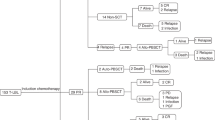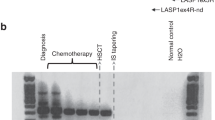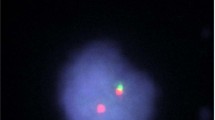Abstract
We sequentially performed cytogenetic analysis and RT-PCR analysis of BCR-ABL transcripts in 17 cases of Ph1-positive ALL who had achieved hematological complete remission (CR) with intensive chemotherapy (CT). Sixteen cases were studied prospectively. All but one of the patients had reached cytogenetic CR, but cytogenetic has low sensitivity in predicting relapse. Twelve patients relapsed, three died in first CR and two were alive in first CR. Two of five, two of four, and five of nine patients who were allografted (in first or second CR), autografted and received consolidation CT, respectively, achieved negative two-round PCR in the bone marrow (BM): three died in CR, three remained in CR with negative two-step PCR in the BM and three relapsed after 22 to 28 months. In all cases, relapse was preceded by switch to PCR positivity in the BM by 4 to 6 months. The remaining nine patients remained PCR-positive in the BM and relapsed after 2 to 16 months. In the four autografted cases, PCR was positive at the time of bone marrow harvest. The two patients who received a purged transplant achieved negative PCR and prolonged CR, whereas the two patients who received an unpurged transplant remained PCR positive and relapsed. In 34% of the samples where analysis was concomitant, sensitivity of PCR proved lower in the blood than in the BM. These findings show that RT-PCR is a useful tool in the monitoring of MRD in Ph1 positive ALL.
This is a preview of subscription content, access via your institution
Access options
Subscribe to this journal
Receive 12 print issues and online access
$259.00 per year
only $21.58 per issue
Buy this article
- Purchase on SpringerLink
- Instant access to the full article PDF.
USD 39.95
Prices may be subject to local taxes which are calculated during checkout
Similar content being viewed by others
Author information
Authors and Affiliations
Rights and permissions
About this article
Cite this article
Preudhomme, C., Henic, N., Cazin, B. et al. Good correlation between RT-PCR analysis and relapse in Philadelphia (Ph1)-positive acute lymphoblastic leukemia (ALL). Leukemia 11, 294–298 (1997). https://doi.org/10.1038/sj.leu.2400567
Received:
Accepted:
Issue date:
DOI: https://doi.org/10.1038/sj.leu.2400567
Keywords
This article is cited by
-
Presence of CD34+CD38−CD58− leukemia-propagating cells at diagnosis identifies patients at high risk of relapse with Ph chromosome-positive ALL after allo-hematopoietic SCT
Bone Marrow Transplantation (2015)
-
Effects of conditioning intensity in allogeneic stem cell transplantation for Philadelphia chromosome-positive acute lymphoblastic leukemia
International Journal of Hematology (2015)
-
Treatment of Philadelphia Chromosome-Positive Acute Lymphoblastic Leukemia
Current Hematologic Malignancy Reports (2013)
-
Impact of minimal residual disease kinetics during imatinib-based treatment on transplantation outcome in Philadelphia chromosome-positive acute lymphoblastic leukemia
Leukemia (2012)
-
Monitoring MRD with flow cytometry: an effective method to predict relapse for ALL patients after allogeneic hematopoietic stem cell transplantation
Annals of Hematology (2012)



